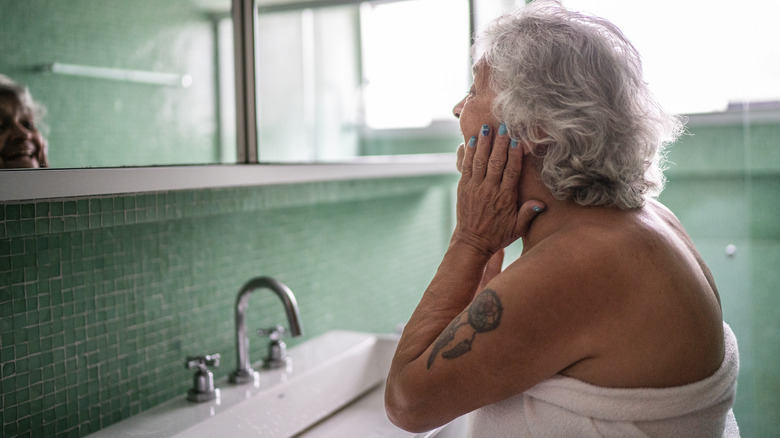Sexual Self-Care Deserves To Be A Regular Part Of Your Wellness Routine
Self-care is both a big industry and a term that's become part of the conversation surrounding self-preservation — The concept of self-care still remains a bit narrow. Facials, massages, mental health days off from work, yoga, and practicing kindness are the types of things that are usually regarded as self-care. But they're certainly not the only ways to care for your body and mind, and feel healthier and more grounded. Sexual self-care offers the same benefits too ... in a different way.
"Practicing sexual self-care is inquiring and creating a relationship with sexuality that is useful for you," sex educator and intimacy coach Georgia Grace told Refinery 29. "It's understanding whatever it means for you and that it is vital to your overall health and happiness ... Sexual self-care doesn't mean you have to be having lots of sex, or you have to be highly orgasmic, or masturbating every day. It's about mindfully experiencing sensations that can expand your relationship with pleasure."
As Grace points out, you don't have to be having sex to practice sexual self-care, because it's more than that. When we understand all aspects of ourselves, including the sexual parts, we create a deeper connection between mind and body — like we do when we meditate, exercise, stretch, or get a massage. Self-care shouldn't be a niche ritual, but something that includes all facets of being human. That's why sexual self-care deserves to be part of your wellness routine. Here are five ways to start doing that.
Book a sexual wellness appointment
Even if you're not currently sexually active, making an appointment to see a doctor for a physical and reproductive wellness exam is an important part of your sexual self-care. These exams, often referred to as "well-woman visits" not only include screening for breast cancer, ovarian cancer, and cervical cancer, but also help a patient navigate menstrual and hormonal concerns, fertility questions, sexual wellness routines, and overall emotional state and mental health.
"So much of your health is impacted by things outside of your body's physical functioning," Ob/Gyn Amanda Elbin, M.D. told Cleveland Clinic. "In addition to screening for physical changes, a lot of what we talk about is your mental health — what's going on in your life, how are your relationships. We spend a lot of time working with people and figuring out how we can help them be their best well-rounded, whole person."
These exams aren't just for cisgender women; they're for anyone who identifies as a woman or who has female anatomy.
"For women who don't have a vagina, a woman's health specialist can work with their primary care physician, or other healthcare providers, to help with managing hormones, medication, or other concerns," continued Elbin. "A women's health specialist can also be a trusted resource for all people to access a sensitive and welcoming healthcare environment to ask questions or get advice."
A healthy body makes for a healthy mind. That's why including annual sexual wellness appointments with trusted doctors that make you feel comfortable is essential. Also, be sure to contact your medical professional if anything is feeling a bit off.
Rediscover your body
Your body is gorgeous and can do remarkable things. This is something that we not only tend to take for granted, but actually sometimes forget. Rediscovering your body isn't just about sexual self-care, but celebration too. If you haven't danced recently, dance. If you haven't stretched your legs and back lately, stretch them. Get yourself special grounding oils and balms to moisturize your body from head to toe, taking a moment to appreciate every inch of it.
"We need to learn to look at, and touch our bodies, with a sense of curiosity and delight rather than judgment and negativity," relationship therapist Karen Aram told Sunday Edit. "Deciding to find positive language to describe what we see and feel under our hands immediately starts to change our perceptions of ourselves."
Admire your body, every angle of it. Take some nude photos of yourself for you and yourself only. You do not need to be sexually active for your body to be sexual and sensual. All you have to do is walk through the Renaissance art wing of a museum and you'll see painting after painting of sensual nakedness in all its raw glory. You may have never sat and posed for Botticelli, but that's only because you were born several centuries too late. So, sit in front of that mirror and pretend he's on the other side — try to see in yourself what he would have seen in you.
Masturbate regularly
Before we jump into masturbation as a form of self-care, it's important to realize that masturbation isn't always steeped in sexual urges. Integrating regular masturbation into your sexual self-care routine means using it as a way to de-stress and relax, relieve aches and pains (including menstrual cramps), build self-confidence and body appreciation, sleep better, and strengthen the immune system. The benefits of masturbation far exceed just getting off — that's why it's so necessary to one's overall well-being.
"Masturbation can be ... an escape from the mundane, or a form of self-soothing," psychologist and certified sex therapist Dr. Janet Brito told Oprah Daily. "It is a perfectly natural and healthy approach to promote emotional regulation, enhance your mood, and be with yourself. After a busy day, masturbation gives you an opportunity to take a break from the pressures of life to reconnect with yourself."
Masturbating regularly also ties in with rediscovering your body, its beauty, and all it's capable of. When you masturbate, you honor your pleasure as well as the mental and physical strength you reap from that pleasure.
Openly talk about sex with your friends and partner
Practicing sexual self-care involves having an outlet; kind of like therapy, but in this case, it could be your friends and partner. Openly talking about sex, sexual health, and sexual wellness with your friends is a big deal in a few ways. You're not just helping remove the taboo still attached to the subject, but you're normalizing that people have sex, and many of us are talking about it. Whether it's the sex we're having, the sex we're not having, the sex we miss, the sex we want, the sex we wish we could forget, or the vibrator we just bought that blew our minds, these discussions are being had.
"I learned that, if you put a group of women and non-binary folks in a room and ask them to talk about sex, they will," clinical psychologist Rena McDaniel, M.Ed. told Bustle. "They will keep talking for eight hours because there is that much to say about a topic we too often ignore ... When we avoid certain topics related to sex and sexuality because they feel hard or bring up shame, we do each other a disservice. Instead of healing, we dive deeper into shame and hiding."
Sex and shame don't belong in the same sentence. Not now, not ever. Tackling this subject in an open way is healthy, empowering, and another component of practicing sexual self-care. It's why brunch was invented.
Reframe your idea of sex — then have it mindfully
For far too long, the word sex was used to signify to penis-in-vagina (PIV) penetration only. But, as we've evolved as a species, a culture, and a society, finally understanding that there are far more than just two genders, a whole boatload of sexualities, and thousands of ways to experience pleasure, the definition of sex is no longer just P-in-V intercourse. When you allow yourself to really comprehend this, it not only opens up a world of sexual possibilities, but gives you the opportunity to learn and present during sexual acts that you may not have considered before. If sexual self-care is the connection of mind and body on a sexual plane, then limiting your idea of sex doesn't promote self-care in any way. It keeps you trapped under a cloud of misinformation — another reason why you should be talking about sex with friends and your partner.
Although sexual self-care isn't going to be the same for everyone, the point is that it should be practiced regularly. Your wellness routine should be all-encompassing, and to do that it should include the sexual parts of yourself.





